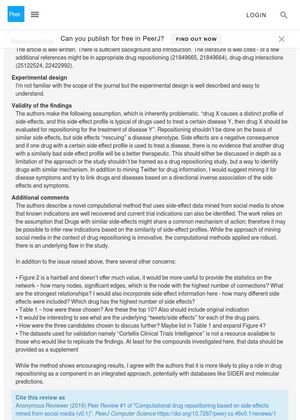Peer Review of Computational Drug Repositioning Based on Side-Effects Mined from Social Media
February 2016

TLDR Reviewers criticized the study for its assumptions, social media data collection issues, and lack of comparison to existing methods.
Seven years ago, a peer review was conducted on a study that aimed to reposition drugs based on side-effects data mined from social media. The reviewers raised concerns about the study's assumptions, data collection methods, and comparison to existing approaches. They questioned the assumption that drugs with similar side-effects could be used to treat the same disease and pointed out potential issues with data collection from social media, such as idiomatic expressions and spelling errors. They also noted that the study did not adequately compare its method to existing approaches. The reviewers criticized the study's limitations, which mainly referred to an unpublished paper, and suggested a better description of the limitations should be provided. They also noted that the data used in the study, which was from Twitter, could not be shared, and the authors did not comment on whether they would share the Tweet IDs to make their experiments repeatable by other researchers.